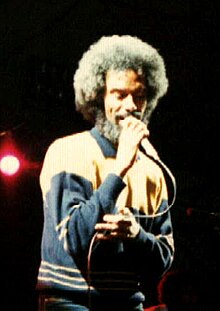1980 (album)
| 1980 | ||||
|---|---|---|---|---|
| File:1980 (Gil Scott-Heron album).jpg | ||||
| Studio album by | ||||
| Released | 1980 | |||
| Length | 35:57 | |||
| Label | Arista | |||
| Producer | Malcolm Cecil, Brian Jackson, Gil Scott-Heron | |||
| Gil Scott-Heron and Brian Jackson chronology | ||||
| ||||
1980 is a studio album by American vocalist Gil Scott-Heron and keyboardist Brian Jackson. It was recorded by the two with producer Malcolm Cecil and a host of studio musicians, including drummer Harvey Mason, guitarist Marlo Henderson, and trombonist Bill Watrous. The record was released by Arista Records in 1980 to positive reviews from critics while charting at number 82 on the Billboard 200.
Music and lyrics

Most of the album was written by Scott-Heron and arranged by Jackson, while its production was handled by them both, alongside recording engineer and producer Malcolm Cecil.[1] They recorded with a team of musicians that included drummer Harvey Mason, guitarist Marlo Henderson, and trombonist Bill Watrous.[2]
"Shut 'Um Down" was written as an anti-nuclear song,[3] while "Alien (Hold On to Your Dreams)" detailed the plight of illegal Mexican immigrants in California. "Push Comes To Shove" and "Willing" described Scott-Heron's philosophy to the pressures of life, and "Late Last Night" was inspired by his touring life and the process of writing music. He wrote the latter as an account of waking up in a hotel room with an idea for a song but being unable to find a paper or instrument to compose. The narrative found him fighting with staff to use the hotel's lounge piano, while losing the song's melody and lyrics from his memory in the distraction.[2] On the title track, Scott-Heron voiced feelings of alienation and disillusionment with the future while reflecting on the past.[2]
Critical reception
In a contemporary review for The Village Voice, Robert Christgau gave 1980 an "A–" and hailed it as Scott-Heron and Jackson's best album yet. "The melodies are only functional", he wrote, "but the rhythms are seductive and the singing is warm."[3] Christgau ranked it as the 32nd best record of 1980 in his year-end list for the Pazz & Jop critics poll.[4] Geoff Brown from Black Music & Jazz Review gave the album four out of five stars and said Scott-Heron's songs were one of the few remedies for alleviating the "creeping suspicion which must afflict us all from time to time, that black artists can only write convincingly these days about the topics of love and dancing."[2] AllMusic's Jeff Schwachter also gave it four stars in a retrospective review, finding it abundant with "perceptive and poignant observations on the state of America as it advanced into a new and uncertain decade". In Schwachter's opinion, the music retained past styles amidst exceptional arrangements of synthesizers, horns, and background vocals, all of which gave the record "a quality that matched the aura of the period", especially on "Alien (Hold On to Your Dreams)".[5]
Track listing
All songs were written and composed by Gil Scott-Heron, except where noted.[1]
- Side one
- "Shut 'Um Down" – 5:28
- "Alien (Hold On to Your Dreams)" – 4:09
- "Willing" – 4:16
- "Corners" (lyrics by Scott-Heron; music by Brian Jackson) – 4:47
- Side two
- "1980" – 6:20
- "Push Comes To Shove" – 3:37
- "Shah MOT (The Shah Is Dead/Checkmate)" – 4:04
- "Late Last Night" – 4:25
Personnel
Credits are adapted from the album's liner notes.[1]
- Ed Brady – guitar (tracks 5 and 6)
- Malcolm Cecil – engineering, mixing, production, production assistance
- Carl Cornwell – flute, saxophone (tracks 5 and 6)
- Donn Davenport – art direction
- John Ford – cover photo
- Gordon Goodwin – horns
- Marlo Henderson – guitar (tracks 1, 2, 4, and 8)
- Brian Jackson – acoustic piano, arrangements, backing vocals (track 5), drums (track 1), electric piano, kettle drums (track 7), keyboard bass, production, synthesizer, T.O.N.T.O. synthesizer (track 7)
- Ron Kellum – art direction
- Harvey Mason – drums (tracks 2 to 8)
- Marti McCall – backing vocals
- Gil Scott-Heron – production, vocals
- Denis Sirias – horns
- Julia Waters – backing vocals
- Maxine Waters Waddell – backing vocals
- Bill Watrous – horns
Charts
| Chart (1980)[5] | Peak position |
|---|---|
| U.S. Billboard 200 | 82 |
| U.S. Top R&B Albums (Billboard) | 22 |
| U.S. Top Jazz Albums (Billboard) | 7 |
References
- ^ a b c Anon. (1980). 1980 (vinyl LP liner notes). Gil Scott-Heron & Brian Jackson. Arista Records. AL 9514.
- ^ a b c d Brown, Geoff (1980). "Nuke the Status Quo". Black Music & Jazz Review. Vol. 3.
- ^ a b Christgau, Robert (March 31, 1980). "Consumer Guide". The Village Voice. Retrieved July 18, 2016.
- ^ Christgau, Robert (February 9, 1981). "The Year of the Lollapalooza". The Village Voice. Retrieved July 18, 2016.
- ^ a b Schwachter, Jeff. "1980 - Gil Scott-Heron". AllMusic. Retrieved July 18, 2016.
